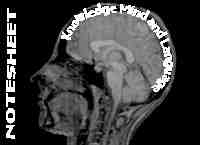Language and thinking
'In some manner, devolving from evolution's blind trials and blunders,
densely crowded packets of excitable cells inevitably come to represent
the world.' Paul & Patricia Churchland.
Language and thinking
Introduction
Synopsis of my points about language:
1. An analytical tool that is often used in trying to understand
language is the distinction between syntax and semantics.
In these terms:-
1a. Computers are very adept at handling syntax - manipulating
uninterpreted symbols according to rules.
1b. How can they be thought of though as attaching meaning to uninterpreted
systems (and strings of uninterpreted symbols)?
2. One theory of what is going on when a person is thinking is that
states of bits of the brain represent propositions and these are manipulated
in various ways. This is the representational theory of thinking.
3. There is another theory, which is the obne sketched by the Churchlands
in Stalking the Wild Epistemic Engine.
4. The strong reasons for rejecting (3) and insisting that thinking
must be quasi-linguistic need to be considered. Fodor's 'Why there
has to be a language of thought' is the central paper here.
The Representational theory of thinking
When a belief passes through my mind, say the belief that my brother
is in London, it reflects a state of part of my brain. That state of
my brain bears meaning, the same meaning as the sentence 'My brother
is in London'.
Or:
'For a subject S to think or "concurrently believe" that
P is for there to be a state of S's central nervous system that bears
the semantic content that p; the state bears that content in much the
same sense and in much the same way that a sentence of English or another
natural language means that p.' Lycan, in Lycan, p.277.
An alternative
The Represntationl theory of thinking belongs to awwhat has been called
the 'rationalist' tradition.
In contrast, the 'naturalistic' approach is inspired by two thoughts:
Human beings have evolved from very much simpler systems.
The rationalist tradition is based on Folk Psychology, which like all
very old theories, likely to be wrong.
'The brain is unlikely to have been adequately groped [sic] by folk
theory in the misty dawn of emerging verbalisation.' (Lycan, Second
edition, p.212.)
The naturalist suggests we view ourselves as 'epistemic engines'.
'The planet abounds in with a wondrous profusion of epistemic engines;
building nests and bowers; peeling bark; dipping for termites; hunting
wildebeests; and boosting themselves off the planet altogether.... The
problem consists in figuring out how epistemic engines work.' (p.213).
In doing so, naturalists suggests de-emphasising language. 'Representations
- information-bearing structures - did not emerge of a sudden with the
evolution of verbally competent animals.' (p.214)
THE CAUSAL ACCOUNT OF 'HOOKING UP' (CF INTENTIONALITY).
Our senses pick up that a lion is approaching, and this causes a brain
state, which then goes on to cause our muscles to move us to safety.
Brain states may thus be thought to be 'calibrated'.
'The backbone of what we are calling calibrational content is the observation
that there are reliable, regular, standardised relations obtaining between
specific neural responses on the one hand, and types of states of the
world.' (p.217)
The snake pit organ may be thought of as 'tuned' to go off if a warm
moving thing occurs within half a metre. But that doesn't mean there
is anything with the structure of language in the neural system.
The Churchlands say the causal approach is promising, but stops being
so if the assumption is that it is a proposition that has to be represented...
END
Revised 24:01:03
|